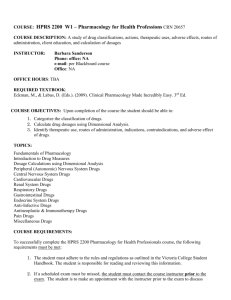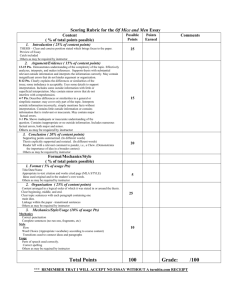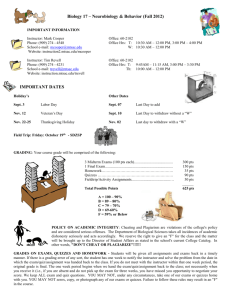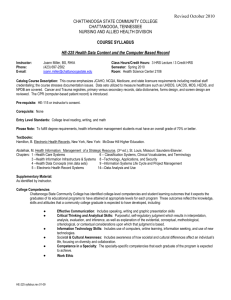ENGL 2120 American Literature II 3 Credit Hours
advertisement
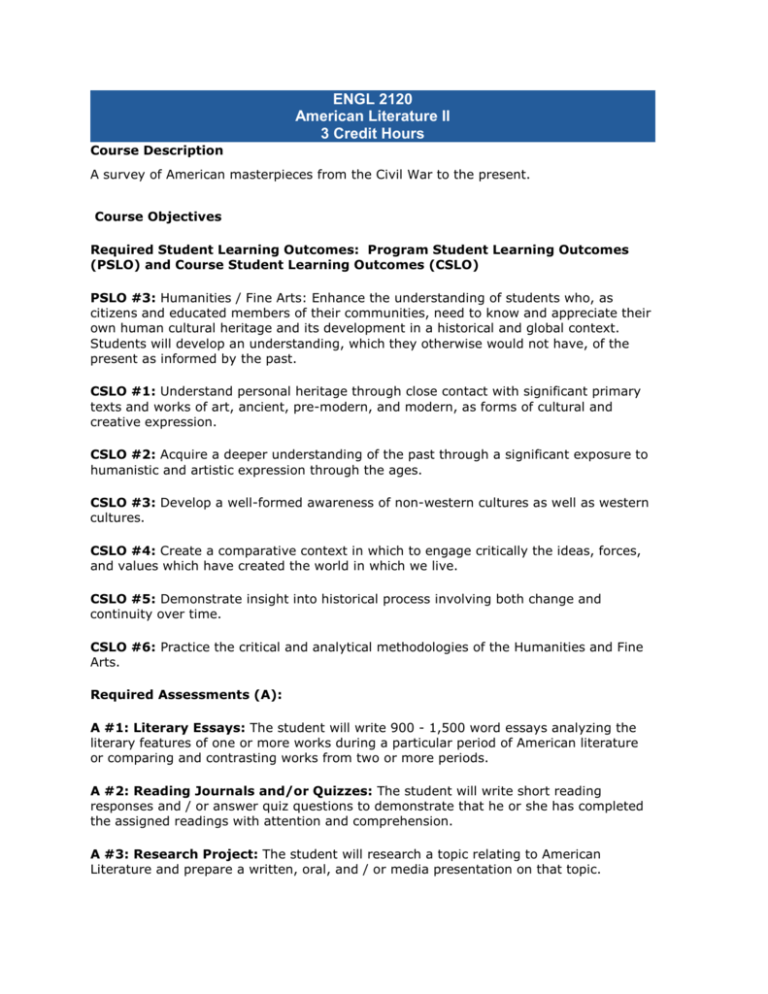
Course Description ENGL 2120 American Literature II 3 Credit Hours A survey of American masterpieces from the Civil War to the present. Course Objectives Required Student Learning Outcomes: Program Student Learning Outcomes (PSLO) and Course Student Learning Outcomes (CSLO) PSLO #3: Humanities / Fine Arts: Enhance the understanding of students who, as citizens and educated members of their communities, need to know and appreciate their own human cultural heritage and its development in a historical and global context. Students will develop an understanding, which they otherwise would not have, of the present as informed by the past. CSLO #1: Understand personal heritage through close contact with significant primary texts and works of art, ancient, pre-modern, and modern, as forms of cultural and creative expression. CSLO #2: Acquire a deeper understanding of the past through a significant exposure to humanistic and artistic expression through the ages. CSLO #3: Develop a well-formed awareness of non-western cultures as well as western cultures. CSLO #4: Create a comparative context in which to engage critically the ideas, forces, and values which have created the world in which we live. CSLO #5: Demonstrate insight into historical process involving both change and continuity over time. CSLO #6: Practice the critical and analytical methodologies of the Humanities and Fine Arts. Required Assessments (A): A #1: Literary Essays: The student will write 900 - 1,500 word essays analyzing the literary features of one or more works during a particular period of American literature or comparing and contrasting works from two or more periods. A #2: Reading Journals and/or Quizzes: The student will write short reading responses and / or answer quiz questions to demonstrate that he or she has completed the assigned readings with attention and comprehension. A #3: Research Project: The student will research a topic relating to American Literature and prepare a written, oral, and / or media presentation on that topic. A #4: Final Examination: The student will take a comprehensive examination that may be comprised of any combination of matching, multiple choice, and / or short answer questions and / or an essay dealing with all four literary periods (Realism, Naturalism, Modernism, and Postmodernism). CSLO / Assessment Alignment: CSLO: CSLO #1: Assessment: Literary Essays CSLO #2: Literary Essays CSLO #3: Literary Essays CSLO #4: Literary Essays CSLO CSLO #5: #6: Literary Literary Essays Essays Reading Reading Research Research Final Journals Journals Project Project Exam and/ or and/ or Quizzes Quizzes Reading Journals and / or Quizzes Research Project Indicators: By the end of the course, students will be able to do the following: • • • • • talk knowledgeably about a variety of time periods and literary works, trace themes and motifs through American literature from 1865 to the present, identify how themes and techniques particular to a certain time period appear in the works of writers from that time period, produce written responses expressing their thoughts about a variety of assigned works, exhibit a knowledge of biographical information for each author studied. Prerequisites and Corequisites English 1020 Course Topics The course will cover selections of American literature from the Civil War up to contemporary times. Students will read stories, poems, novels, and/or plays from the realist, naturalist, modern, and postmodern literary periods. Specific Course Requirements To do well in this course, students should be prepared to read, analyze, and interpret the assigned literary works, retain specific knowledge about the works and their authors, and express ideas about the works in writing. Textbooks, Supplementary Materials, Hardware and Software Requirements Required Textbooks: There are no required textbooks for this class. All study materials for this course are contained in the online environment either as course lessons or as links to Internet sources. Although full texts are available online (links are provided), students who prefer reading hard copies of materials may want to purchase an anthology of American literature (Norton, Bedford, and Heath are standard versions). Many of the materials we read are typically found in these anthologies. You can often find these very inexpensively at used bookstores or online. Make sure you purchase an edition containing American literature post-1865. In addition, you might wish to purchase copies of Huckleberry Finn and Daisy Miller since those are the two fulllength novels we will read for the course. The RODP Bookstore link is http://rodp.bkstr.com ; however, no textbooks are required for this class. Supplementary Materials None Hardware Requirements The minimum requirements can be found at http://www.rodp.org/students/hardware_software.htm. No additional hardware requirements are needed for this course. Software Requirements Students must submit their writing assignments in one of the following formats: • • • Microsoft Word (filename.doc) Rich Text Format (filename.rtf) HTML (filename.htm) Students who cannot create files of one of these types will need to check with the instructor at the beginning of class to explore alternatives. Instructor Information Since different instructors may be teaching different sections of this course, please see the separate page inside the course to find the instructor's contact information. Assessment and Grading Testing Procedures Students will take their reading and essay quizzes using the online quiz function. Students will take a PROCTORED Final Exam in this course (100 points). • • • The proctored Final Exam will pull 50 questions randomly from the reading quizzes. Students must set up their proctors for the Final Exam at the beginning of the semester. For directions on how to set up a proctor, see http://www.rodp.org/students/proctor.htm Grading Procedure ASSESSMENTS Introduction Discussion and Practice Quiz 2 @ 10 pts ea = 20 BONUS pts total The initial discussion and practice quiz, each worth a possible 10 points, are worth a total of 20 BONUS points. Discussions and Class Participation 10 @ 20 pts ea = 200 pts total Class participation will be evaluated throughout the course. Students will participate in a variety of discussion assignments to ensure that they are fully involved in the community of scholars that makes up their learning environment. Ten (10) discussion assignments, each worth a possible 20 points, will count a possible 200 points toward the final grade. Module Essay Response Assignments 3 @ 75 pts ea = 225 pts total Students will be asked to write an Essay Response at the end of each module. These three (3) essays, each worth a possible 75 points, will count a possible 225 points toward the final grade. Students should keep back-up copies of all written assignments. Quizzes 9 @ 25 pts ea = 225 pts total Students will take quizzes to test their knowledge of specific works and to test their ability to apply knowledge of key words and concepts to those specific works. These quizzes will take the form of multiple-choice, matching, fill in the blank, short answer, and/or essay questions. There will be nine (9) quizzes, each worth a possible 25 points, making the total possible score on reading quizzes worth 225 points toward the final grade. Class Project 1 @ 150 pts = 150 pts total Students will submit a Class Project to test their ability to analyze and interpret literature and their ability to understand works of literary criticism. The Class Project is worth a possible 150 points toward the final grade. Students should keep back-up copies of all written assignments. Class Paper 1 @ 100 pts = 100 pts total Students will submit a Class Paper to test their ability to analyze and interpret literature on their own. The Class Paper is worth a possible 100 points. Students should keep back-up copies of all written assignments. Final Exam 1 @ 100 pts = 100 pts total Students will take a proctored final exam that is comprised of a randomized selection of questions from all modules of the course. SUMMARY OF ALL ASSIGNMENT POINTS • • • • • • • Discussions = 200 points Essay Responses = 225 points Quizzes = 225 points Project = 150 points Paper = 100 points Final Exam= 100 points TOTAL = 1000 points Total of all assignments = 1000 pts (with 20 pts possible BONUS) GRADING SCALE A = 900-1000 pts B = 800-899 pts C = 700-799 D = 650-700 F = <650 High Achievement To achieve the highest grade in this course, students should • • • • keep up with reading assignments (both in the textbook and in the content pages of the course); read the literary texts more than once when possible, making notes along the way; make every attempt to delve below the surface meaning of the text; attempt to find connections between (1) ideas within one text, (2) ideas in more than one text, (3) the text and the society which produced it, (4) the text and the contemporary world. Reading Assignments: Module 1 - The Late Nineteenth Century • • • • • • • Twain, Huckleberry Finn James, Daisy Miller Gilman, "The Yellow Wallpaper" Chopin, "Desiree's Baby" Crane, "The Open Boat" Whitman, Preface to the 1855 Leaves of Grass; "Song of Myself" (sections 1-7, 15, 16, 20, 21, and 52); and "I Hear America Singing" Dickinson, "Some keep the Sabbath" and "One need not be a chamber" Module 2 - The Twentieth Century (1900 to 1945) • • • • • • • • • Johnson, Autobiography of an Ex-Colored Man (selection) Du Bois, Souls of Black Folk (selection) Hurston, "How It Feels to Be Colored Me" and "The Gilded Six-Bits" Fitzgerald, "Winter Dreams" Hemingway, "Hills Like White Elephants" Glaspell, "A Jury of Her Peers" Cummings, "in Just-" and "she being Brand..." Robinson, "Miniver Cheevy" Sandburg, "Chicago" Module 3 - The Twentieth Century (1945 to present) • • • • • • • • • Heller, Catch 22 (selection) O'Connor, "A Good Man Is Hard to Find" Baldwin, "Sonny's Blues" Walker, "Everyday Use" Alexie, "What You Pawn I Will Redeem" Giovanni, "Nikki-Rosa," "Knoxville, Tennessee," and "Resignation" Soto, "The Tale of Sunlight" Rotheke, "My Papa's Waltz" Brooks, "A Bronzeville Mother Loiters in Mississippi..." Class Participation: Students will be expected to communicate regularly with the instructor and with other students via course email and discussion postings. Students should keep up with assignment deadlines, and they should submit assignments on time. Students should check their course news, email, and discussion areas regularly to check for important information. Punctuality: To receive full credit, students must hand assignments in on time. 10% of the score will be taken away for each 24-hour period a paper or other assignment is late. Assignment due dates can be found on the course calendar. Course Ground Rules This course moves quickly. Students must keep up with their reading or they will have a very difficult time catching up. Students who have not had any previous experience with online courses must be willing to dive in and learn quickly. The instructor will provide tools to make this learning process easier. In addition, many other students taking will have had prior experience with online courses and are usually happy to assist their less experienced classmates. Students should communicate with the instructor and their other classmates regularly. They should use their assigned course email addresses in regular communication. They should also give the instructor a personal email address for a backup. Students should address technical problems immediately. A toll-free telephone number and a web link to the Helpdesk are provided below. The instructor of this course always welcomes questions, but students should be sure to read all of the pertinent pages in the online class content area before asking questions about assignments, procedures, and requirements. Usually, all of the information needed can be found there. To excel in this or any other online course, students must be willing and motivated to do a lot of reading online. Students should observe course netiquette at all times. This includes being respectful of others in all email and discussion posts. A good rule of thumb is write as though your little old granny were going to read it. (It goes without saying that your little old granny was also a terrific literary critic.) Plagiarism will not be tolerated. Students who copy someone else’s work (from the Internet or anywhere else) and pass it off as their own will get a "0" on the assignment or fail the course. Since Composition I and II are prerequisites for American Masterpieces II, you are expected to know and understand rules of documentation when you enter this course. Rules of documentation are reviewed within the course, but ignorance of documentation rules will not be accepted as an excuse for plagiarism. Guidelines for Communications Email: • • • • • • Always include a subject line. Remember without facial expressions some comments may be taken the wrong way. Be careful in wording your emails. Use of emoticons might be helpful in some cases. Use standard fonts. Do not send large attachments without permission. Special formatting such as centering, audio messages, tables, html, etc. should be avoided unless necessary to complete an assignment or other communication. Respect the privacy of other class members Discussion Groups: • • • • • • • Review the discussion threads thoroughly before entering the discussion. Be a lurker then a discussant. Try to maintain threads by using the "Reply" button rather starting a new topic. Do not make insulting or inflammatory statements to other members of the discussion group. Be respectful of other's ideas. Be patient and read the comments of other group members thoroughly before entering your remarks. Be cooperative with group leaders in completing assigned tasks. Be positive and constructive in group discussions. Respond in a thoughtful and timely manner. Chat: • • • • • Introduce yourself to the other learners in the chat session. Be polite. Choose your words carefully. Do not use derogatory statements. Be concise in responding to others in the chat session. Be prepared to open the chat session at the scheduled time. Be constructive in your comments and suggestion. Web Resources: • • Columbia Guide to Online Style by Janice R. Walker and Todd Taylor Citation Styles Online http://www.bedfordstmartins.com/online/cite6.html These resources provide guidelines for citing sources used in academic papers. For this course, be sure to follow the guidelines for MLA style documentation. The MLA (Modern Language Association) style is the one most commonly used in the humanities disciplines. Library The Tennessee Virtual Library is available to all students enrolled in the Regents Degree Program. Students will use this resource to complete their critical paper assignment for the course. Students With Disabilities Qualified students with disabilities will be provided reasonable and necessary academic accommodations if determined eligible by the appropriate disability services staff at their home institution. Prior to granting disability accommodations in this course, the instructor must receive written verification of a student's eligibility for specific accommodations from the disability services staff at the home institution. It is the student's responsibility to initiate contact with their home institution's disability services staff and to follow the established procedures for having the accommodation notice sent to the instructor. Syllabus Changes The instructor reserves the right to make changes as necessary to this syllabus. If changes are necessary during the term of the course, the instructor will immediately notify students of such changes both by individual email communication and posting both notification and the nature of any changes on the course bulletin board. In cases of variation between the public syllabus and the syllabus contained inside the virtual classroom, the classroom version is the official version of the course syllabus. Technical Support For HELP with • • • TECHNICAL PROBLEMS - please visit the AskRODP Customer Support web page at http://help.rodp.org or call the AskRODP Help Desk at 1-866-550-RODP (1866-550-7637). REGISTRATION PROBLEMS - contact your home school RODP Campus Contact. TBR-RODP RELATED ISSUES - contact RODP Help Desk at 1-888-223-0023.

